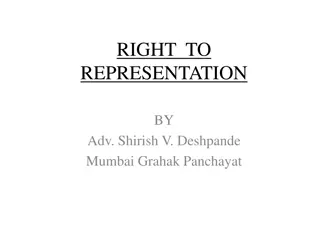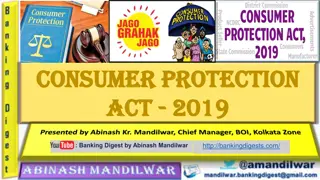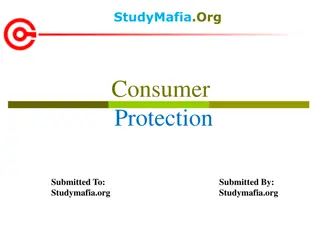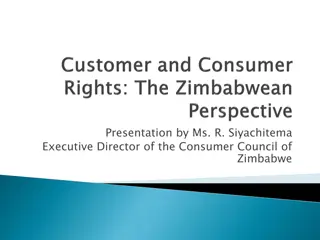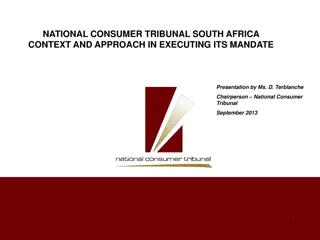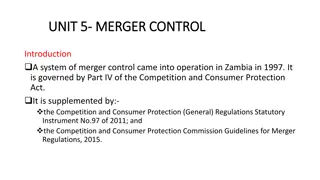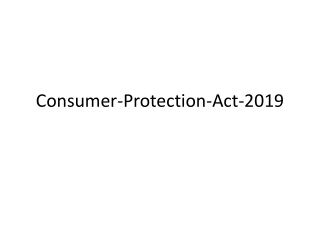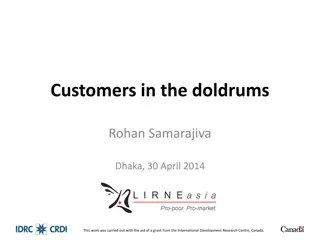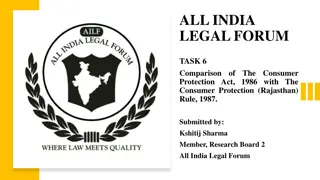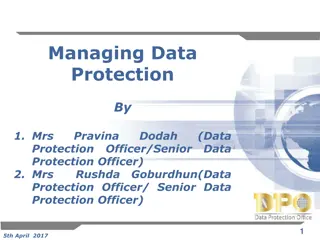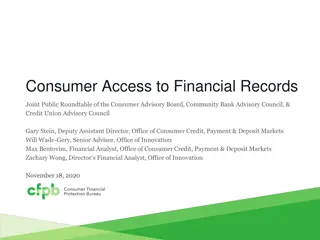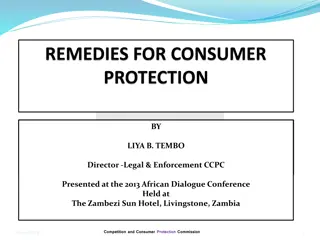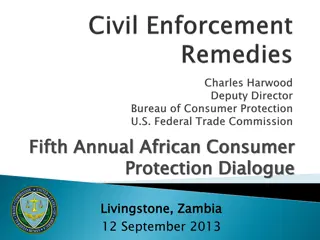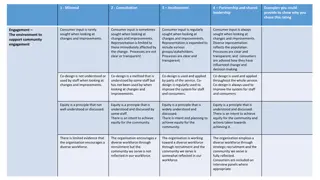Understanding Consumer Protection: Rights, Act, and Objectives
Consumer Protection encompasses laws and organizations ensuring consumer rights, fair trade, and accurate information in the marketplace. The objectives include safeguarding health, educating consumers, providing complaint resolution, and promoting consumer organizations. Consumers have rights to safety, choice, information, education, being heard, and seeking redressal against unfair practices. Upholding these rights is essential for a fair and just marketplace.
Download Presentation

Please find below an Image/Link to download the presentation.
The content on the website is provided AS IS for your information and personal use only. It may not be sold, licensed, or shared on other websites without obtaining consent from the author. Download presentation by click this link. If you encounter any issues during the download, it is possible that the publisher has removed the file from their server.
E N D
Presentation Transcript
Who is a Consumer? A consumer is a person who buys goods and services for personal use. What is consumers protection act? Consumer Protection Act is a group of laws and organisations designed to ensure the rights of the consumers as well as fair trade, competition and accurate information in the marketplace.
OBJECTIVES OF THE CONSUMER PROTECTION ACT Protect consumers from hazards that pose risks to their health and safety. Educate consumers about their fundamental rights. Provide a channel for quick and efficient resolution of complaints including the imposition of fines and damages. Promote the development of organizations formed for the protection of the consumer.
Right to safety : Means right to be protected against the marketing of goods and services, which are hazardous to life and property. The purchased goods and services availed of should not only meet their immediate needs, but also fulfil long term interests. Before purchasing, consumers should insist on the quality of the products as well as on the guarantee of the products and services. They should preferably purchase quality marked products such as ISI,AGMARK, etc Right to choose: Means right to be assured, wherever possible of access to variety of goods and services at competitive price. In case of monopolies, it means right to be assured of satisfactory quality and service at a fair price. It also includes right to basic goods and services. This is because unrestricted right of the minority to choose can mean a denial for the majority of its fair share. This right can be better exercised in a competitive market where a variety of goods are available at competitive prices Right to be informed: Means right to be informed about the quality, quantity, potency, purity, standard and price of goods so as to protect the consumer against unfair trade practices. Consumer should insist on getting all the information about the product or service before making a choice or a decision. This will enable him to act wisely and responsibly and also enable him to desist from falling prey to high pressure selling techniques.
Right to consumer education: Means the right to acquire the knowledge and skill to be an informed consumer throughout life. Ignorance of consumers, particularly of rural consumers, is mainly responsible for their exploitation. They should know their rights and must exercise them. Only then real consumer protection can be achieved with success. Right to be heard: Means that consumer's interests will receive due consideration at appropriate forums. It also includes right to be represented in various forums formed to consider the consumer's welfare. The Consumers should form non-political and non-commercial consumer organizations which can be given representation in various committees formed by the Government and other bodies in matters relating to consumers. Right to Seek redressal: Means right to seek redressal against unfair trade practices or unscrupulous exploitation of consumers. It also includes right to fair settlement of the genuine grievances of the consumer. Consumers must make complaint for their genuine grievances.Many a times their complaint may be of small value but its impact on the society as a whole may be very large. They can also take the help of consumer organisations in seeking redressal of their
DISTRICT FORUM Composition: Every district forum shall consist of the following:- President-a person who is qualified to be a district judge, who shall be its president Two other members-one of the two member shall be a woman. They should be not less than 35 years of age possessing a bachelor s degree from a recognised university. They should have an experience for atleast 10 years in dealing with problems relating to economics, law, commerce, accountancy, industry, public affairs or administration. POWERS: The Consumer Protection Act vests the District forum with the powers given to a Civil Court by the Code of Civil Procedure, 1908. The power to summon and enforce the attendance of any defendant or witness and examining the witness on oath. The authority to order for discovery and production of any document or other material object producible as evidence; The power to receive evidence on affidavits; The power to requisition the report of the concerned analysis or test from the appropriate laboratory or from any other relevant source; The power to issue any commission for the examination of any witness. Moreover, the Act says that the proceedings before the District Forum shall be deemed to be a judicial proceeding within the meaning of Section 193 and 228 of the Indian Penal Code. Hence, a person giving false evidence can be punished under the Penal Code. The power to proceed against a person for contempt of court is also provided for. 1. 2.
FUNCTIONS: District Consumer Forum functions in a consumer friendly way. A consumer can file a complaint and also address arguments in person. In genuine cases where the complainant/ appellant/ petitioner before the District Consumer Forum is unable to engage the services of an advocate, legal aid is provided by the forum free of charge. District Consumer Forum can take a case for value up to Rupees 20 Lakh. A consumer unsatisfied by the decision of the District Consumer Forum , can appeal to the State Commission and a consumer unsatisfied by the decision of the State Commission, can appeal to the National Commission. JURISDICTION: A. Pecuniary Jurisdiction: The district forum shall have jurisdiction to entertain complaints where the value of the goods and services and the compensation, if any, claimed does not exceed rupees twenty lakhs. B. Territorial Jurisdiction: A complaint shall be instituted in a district forum within the local limits of whose jurisdiction- a) The opposite party or each of the opposite parties, where there are more than one, at the time of the institution of the complaint, actually and voluntarily resides or carries on business, or has a branch office or personally works for gain. In such a case, it is necessary that there should be either the permission of the district forum. b) The cause of action, wholly or in part, arises.
STATE COMMISSION COMPOSITION: Each State Commission shall consist of One President and two or more other members. 1. The President: The President shall be a person who is or has been a Judge of a High Court, appointed by the State Government. His appointment should be made in consultation with the Chief Justice of High Court. 2. Members: In the state commission there should be not less than two, and not more than such number of members, as may be prescribed, and one of whom shall be a woman. They should be not less than thirty-five years of age. They should possess a bachelor's degree from a recognised university. They should be persons of ability, integrity and standing, and have adequate knowledge and experience of at least ten years in dealing with problems relating to economics, law, commerce, accountancy, industry, public affairs or administration. Provided that not more than fifty petcent of the members shall be from amongst persons having a judicial background.
JURISDICTION: Subject to the other provisions of this Act, the State Commission shall have jurisdiction Pecuniary Jurisdiction: Complaints where the value of the goods or services and compensation, if any, claimed exceeds rupees twenty lakhs but does not exceed rupees one crore, then it comes under the pecuniary jurisdiction of State Commission. Appellate Jurisdiction: Section 15 of the Act gives the right to prefer an appeal to the state commission within a period of thirty days from the date of order of the District Forum to any person who has been aggrieved by the order. The time limit may be extended by the state commission on showing sufficient cause.The person making an appeal should deposit 50% of the decreed amount or Rs.25000/- whichever is less. This requirement has been introduced by the Consumer Protection (Amendment) Act, 2002.
NATIONAL COMMISSION COMPOSITION: The National Commission consists of a president, and four other members (one of whom is to be a woman). 1. The president: THE PRESIDENT should be the one who is or has been a Judge of the Supreme Court. He shall be appointed by the Central Government. 2. the members : THEY should be the persons of ability, integrity and standing and have adequate knowledge or experience of, or have shown capacity in dealing with, problems relating to economics, law, commerce, accountancy, industry, public affairs or administration. He should not be less than 35 years of age and should possess a bachelor s degree from a recognised university.
JURISDICTION: The National Commission constituted under the Consumer Protection Act, 1986, and shall have Jurisdiction 1. PECUNIARY JURISDICTION - Since National Commission is the highest level of Consumer Forums, it may entertain all the matters where the value of claim exceeds Rs. 20 lakh. 2. APPELLATE JURISDICTION - The National Commission has jurisdiction to entertain appeals against the order of any State Commission. The appeal may be made within 30 days from the date of the order of the State Commission. However the National Commission may entertain an appeal filed after the expiry of 30 days if it is satisfied that there was sufficient cause for not filing the appeal within the given time.
CONSUMER PROTECTION COUNCIL The Consumer Protection Act postulates establishment of Consumer Protection Councils at the Central and State levels for the purpose of spreading consumer awareness. The objects of the Councils, as per the Act, shall be to promote and protect the rights of the consumers such as: The right to be protected against the marketing of goods and services which are hazardous to life and property The right to be informed about the quality, quantity, potency, purity, standard and price of goods or services, as the case may be so as to protect the consumer against unfair trade practices; The right to be assured, wherever possible, access to a variety of goods and services at competitive prices; The right to be heard and to be assured that consumer's interests will receive due consideration at appropriate forums The right to seek redressal against unfair trade practices or restrictive trade practices or unscrupulous exploitation of consumers and The right to consumer education.
Central Consumer Protection Council: The Consumer Protection Act empowers the Central Government to establish a Central Consumer Protection Council consisting of the Minister in charge of consumer affairs in the Central Government as its Chairman and such number of other official and non-official members representing such interests as may be prescribed. Under the Consumer Protection Council Rules 1987, the membership of the Council is restricted to 150 members including the Central Minister in charge of Consumer Affairs as the Chairman. The term of the Council is three years. To monitor the implementation of the recommendations of the Council, the Central Government may constitute a standing working group from amongst the members of the council under the Chairmanship of the Member Secretary of the Council. The Council shall meet as and when necessary, but at least one meeting of the Council shall be held at such time and place as the Chairman may think fit. State Consumer Protection Council: The Consumer Protection Act provides for the establishment of State Consumer Protection Councils by the State Governments. The State Council shall consist of a Minister in charge of consumer affairs in the State Government as its Chairman and such number of other official or non-official members representing such interests as may be prescribed by the State Government and ten nominees of the Central Government. The State Council shall meet as and when necessary but not less than two meetings shall be held every year at such time and place as the Chairman may think fit. District Consumer Protection Council: In order to promote and protect the rights of consumers, within the district, the Consumer Protection Act, provides for the establishment of a District Consumer Protection Council in every district. It shall consist of the Collector of the district as its Chairman and such number of other official and non-official members representing such interests as may be prescribed by the State Government. It shall meet as and when necessary but not less then two meetings shall be held every year. The Chairman shall decide the time and place of the meeting.
CONSUMER COMPLAINT made by a complainant/consumer against the cheated company. There are some procedures to follow before filing a complaint. Firstly, send a notice in writing to the company asking to rectify the faults, defects etc or to replace the goods within one month. If there is no respond from the company within the notice period, the consumer can file the complaint. A complaint can be filed on a plain paper. In addition to the complaint 3 to 5 copies of the complaint to be submit (as there are many respondents). The complaint affidavit should be attested by a notary. The court will send a notice with the complaint copy to the opposite party seeking reply within 30 days, and asking it to attend the hearing. The complaint is to be filed within two years from the date on which cause of action has arisen. If there are reasonable causes for delay in filing the Complaint, complainant can always request the Consumer Forum to condone the delay. An Application for condonation of delay with the reasons for the delay should be duly affirmed before a notary public. Under the Consumer Protection Act, 1986, a complaint means any allegation in writing A complaint should contain the following information: - (a) The name, description and the address of the complainant (b) The name, description and address of the opposite party or parties, as the case may be, as far as they can be ascertained (c) The facts relating to complaint and when and where it arose (d) Documents, if any, in support of the allegations contained in the complaint (Copies of all documents duly signed by the complainant)
(e) The relief, which the complainant is seeking. The complainant or his authorized agent /advocate can present the complaint in person. The complaint should sign by the complainant. In the event of the death of a complainant, his/her legal heir or representative can continue as a complainant. The complaint can be sent by post to the appropriate Forum / Commission. Section 12 of the Act states: Manner in Which Complaint Shall be Made A complaint in relation to any goods sold or delivered or agreed to be sold or delivered or any service provided or agreed to be provided may be filed with a District Forum, by (a) the consumer to whom such goods are sold or delivered or agreed to be sold or delivered or such service provided or agreed to be provided; (b) any recognized consumer association whether the consumer to whom the goods sold or delivered or agreed to be sold or delivered or service provided or agreed to be provided is a member of such association or not; (c) one or more consumers, where there are numerous consumers having the same interest, with the permission of the District Forum, on behalf of, or for the benefit of, all consumers so interested; or (d) the, Central or the State Government


